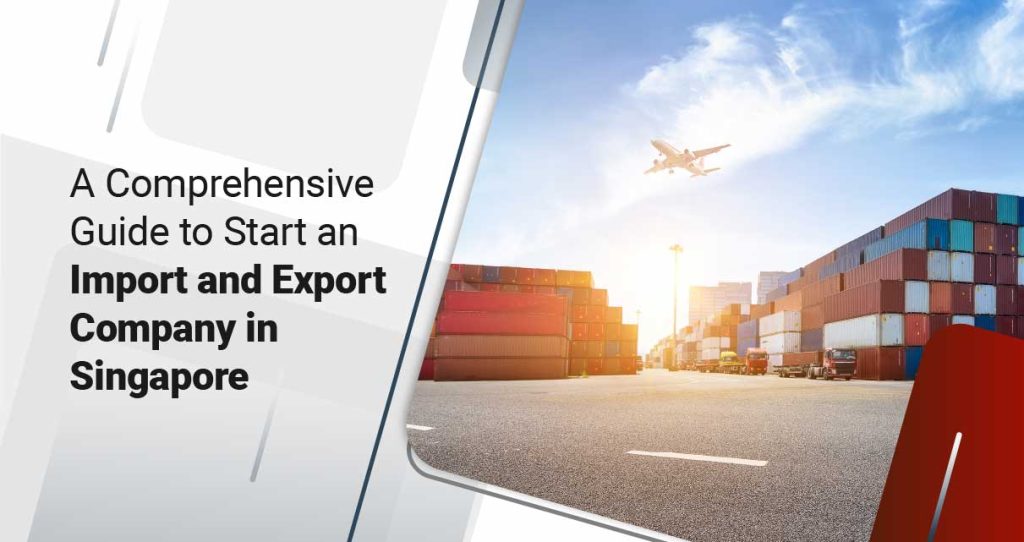Singapore is a major hub for global commerce. Its strategic geographical location, advanced infrastructure, and attractive tax regime encourage traders to expand to this economic powerhouse. To start a business in Singapore, you must understand its target markets, trade regulations, and local business practices. This article will provide you with a brief guideline on how you can set up a successful import and export company in Singapore.
Why Choose Singapore to Set Up An Import Export Business?
Strategic Location

Singapore’s location in the heart of Southeast Asia provides easy access to major markets in Asia, including China, India, and ASEAN countries. Singapore sits astride a critical maritime route which, valued at almost S$5 trillion trade annually, traverses between the East and West. Notably, Singapore handles close to 30% of all trade within Asia.
Low Barrier to Entry
The low barrier to entry makes it easy for businesses to set up an import and export company in Singapore with minimal obstacles. Besides, the streamlined registration process and efficient government services help entrepreneurs to start their businesses quickly and smoothly.
Attractive Tax System
Singapore’s tax system offers various tax relief schemes. With the help of it, individuals and companies can benefit from competitive income tax rates of up to 22% and of 17%, respectively.
Singapore has also concluded over 70 avoidance of double taxation agreements (DTA) with various countries. This allows taxpayers to enjoy reduced withholding tax rates on their foreign income.
6 Steps to Set Up An Import and Export Company in Singapore

Follow these five steps to set up a thriving import or export business in Singapore while confidently managing the different regulations and requirements:
Company Incorporation
The key requirements for starting a company in Singapore include
- Must have at least one shareholder
- A resident director and company secretary
- An initial paid-up share capital of at least S$1
- A physical office address in Singapore.
Additionally, you must register your private limited company through ACRA via BizFile+.
- First of all, you have to choose a company name and check its availability
- Prepare the necessary documents such as the company constitution, shareholders’ details, directors, company secretary, and the registered office address
- Submit the incorporation application and pay the required fees through BizFile+
- Get an ACRA-issued certificate after approval
Activate Your Singapore Customs Account
Initiating your Singapore Customs Account requires a visit to the Singapore Customs website and accessing the Customs Account portal. Submit an application with your business’s valid UEN (Unique Entity Number) and designate a primary and secondary contact person.
Once your application is submitted, expect a response within four working hours. This swift processing time enables timely activation of your Customs Account, facilitating immediate use for your business needs.
Check if Your Goods Are Controlled
To determine if your goods are regulated, search for them using their description, Harmonized System (HS) code, or CA product code on the government or customs authority’s website. The Competent Authority (CA) name will be listed alongside the HS code if the goods are controlled. Contact the relevant CA directly to inquire about licensing requirements.
For guidance on the complete 8-digit HS code, you can request an official classification ruling for each product, which costs S$75. This ruling ensures accurate classification of your goods, aiding compliance with import/export restrictions and preventing legal issues concerning controlled goods.
Check if Your Goods are Considered Strategic
Utilise the TradeNet system to identify if your goods meet the criteria for being considered strategic and require a transhipment permit for export. It serves as a comprehensive trade facilitation portal to electronically submit trade documents and permits for importing, exporting, and transshipping goods in Singapore.
Apply for Licenses and Permits
To operate an import and export business in Singapore and work as a freight forwarder, obtaining the required permits and licenses is necessary. This process includes obtaining Customs Import and Export Permits from Singapore Customs for the shipment of goods.
Additionally, applying for IN/OUT Permits is essential to import and export controlled goods. These permits are required to move items such as strategic goods, hazardous chemicals, and pharmaceutical products.
For exporting local goods, it is important to acquire Certificates of Origin, which certify the origin of the goods being exported.
Prepare Documents to Submit for Customs Clearance
Ensure you furnish all necessary supporting documents to obtain the export permit. These documents comprise the packing list, invoice, airway bill, or lading bill, along with your permit number requirement. Moreover, you can secure a certificate of origin for goods manufactured in Singapore using the TradeNet system, which might be obligatory for your target market.
Regulations on Import and Export of Goods Transiting Through Singapore

To import and export goods transiting through Singapore, obtaining the requisite permits and authorisation from the competent authorities is essential. This process typically involves several steps, including –
- First, register with customs as a declaring agent and transhipment agent
- The next step is to obtain a transhipment permit to move goods from one vessel to another within the port
- Subsequently, the cargo clearance process can be finalised by furnishing the pertinent documentation to customs. This includes the bill of lading, commercial invoice, packing list, and any other necessary documents
- Customs will then inspect and assess the goods to ensure compliance with customs regulations and requirements
Regulations on Import and Export of Goods Not Transiting Through Singapore
When starting the import and export of goods, not transiting through Singapore, it is necessary to register a business in the country where the operations will occur, ensuring compliance with local laws and regulations.
Additionally, the necessary documentation must be prepared considering the specific requirements of the importing and exporting countries, including,
- Invoices
- Packing lists
- Certificates of origin
Clearance processes, including customs inspections and verification of goods, are also part of the import-export procedures.
Exporting and Transit
To export goods, obtaining a customs permit is mandatory. Exporters have two options: they can obtain the permit themselves or utilise the services of a declaring agent. Registering as a declaring agent enables the representation of multiple exporters and simplifies the process.
Alternatively, exporters can authorise a declaring agent to manage the customs permit application.
Importing
The import of both dutiable and non-dutiable goods into Singapore for domestic consumption necessitates paying duties along with the Goods and Services Tax (GST), managed by the Inland Revenue Authority of Singapore (IRAS). It is calculated at 7% of the cost, insurance, and freight (CIF) value.
Where to Store Goods?
In Singapore, companies have several options for storing goods, including:
- Licensed Warehouses: These are approved by Singapore Customs and are suitable for storing dutiable goods.
- Zero-GST Warehouses: These facilities are intended for storing non-dutiable goods, enabling companies to store items without paying Goods and Services Tax (GST) until they are withdrawn for local consumption.
- Free Trade Zone Warehouses: These warehouses offer a duty-free environment for storing, handling, and re-exporting goods. Items stored in these facilities are exempt from customs duties and GST, making them an appealing choice for companies involved in international trade.
Financial Considerations to Set Up an Import Export Company in Singapore

Create a Corporate Bank Account
First, you must open a corporate account in Singapore to perform financial activities worldwide. Singapore provides an array of options for corporate account setup, collaborating with trusted partner banks like
- DBS Bank
- OCBC Bank
- UOB
- Standard Chartered
- Citibank
- HSBC
Business Loans
There are several types of loans available in Singapore:
- SME Micro Loan: This scheme is a government-supported financing program tailored for local SMEs. Companies with at least 30% local shareholding and annual revenues less than S$1M or fewer than 10 employees can access up to S$100,000 in funding.
- SME Working Capital Loan: Launched by Spring Singapore (now Enterprise Singapore) in June 2016, this government-supported financing scheme provides Singapore SMEs with access to up to S$500,000 in funding.
- Unsecured Business Term Loan: The lump sum, typically between S$50,000 and S$300,000, is repaid via equal monthly instalments spread over three to five years.
Letter of Credit (LC)
This financial document serves as a guarantee from a buyer’s bank to the exporter that payment will be made once the terms of the contract are met. The process of obtaining an LC begins with the buyer and the exporter agreeing to use this payment method. The buyer’s bank then issues the LC, which is sent to the exporter’s bank. The exporter’s bank verifies the LC to ensure it is authentic and then notifies the exporter of its receipt.
Trade Credit Insurance Scheme (TCIS)
It serves as a safeguard that import-export businesses can procure to shield against buyer non-payment. This enables a business to engage new customers with enhanced confidence and diminished default risk.
If eligible, the government may subsidise up to 50% of the minimum insurance premium for TCI policies offered by Singapore-registered credit insurers, with a maximum lifetime support of S$100,000 per company.
Let InCorp Guide You Through the Company Incorporation Process
Navigating the landscape of business incorporation in Singapore for your import and export company can be complex, given the myriad of regulatory and financial considerations. This is where we step in with a comprehensive suite of services tailored to simplify the process for entrepreneurs and businesses aiming to establish their presence in Singapore.
Contact our friendly team today to find out how we can assist!
FAQ's
How do I apply for a cargo clearance permit in Singapore?
- Singapore Customs's TradeNet system offers import permits, also known as cargo clearance permits, for S$11 each. Approval is contingent upon meeting all import requirements. The permit remains valid for two weeks and can be applied for by submitting a declaration via TradeNet.
Is GST compulsory to be paid for all imported goods in Singapore?
- For goods imported via air or post, excluding dutiable items, GST is not applicable at the point of importation if the CIF value is S$400 or less. Nonetheless, GST applies to the entire sum if the CIF value exceeds S$400.
What is import duty in Singapore?
- The Goods and Services Tax (GST) in Singapore was 8.0%, but it has now risen to 9.0% from January 1, 2024. Dutiable goods are subject to GST calculated on the CIF (Cost, Insurance, and Freight) value, incorporating all duties and ancillary fees.


